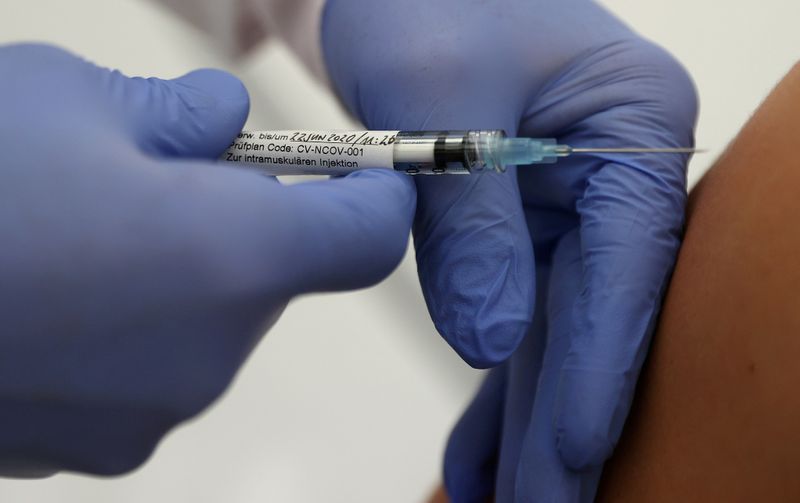By Kate Kelland
LONDON (Reuters) - Emerging evidence that the body's immune defence against COVID-19 may be short-lived makes it even harder for vaccine developers to come up with shots fully able to protect people in future waves of infection, scientists said on Tuesday.
Preliminary studies in China, Germany, Britain and elsewhere have found that patients infected with the novel coronavirus make protective antibodies as part of their immune system's defences, but these appear to last only a few months.
"Most people make them (antibodies), but often they can wane rather rapidly, suggesting there could be little immunity," said Daniel Altmann, a professor of immunology at Imperial College London.
That raises big problems for developers of potential COVID-19 vaccines, experts say - and for public health authorities seeking to deploy them to protect populations from future waves of the pandemic.
"It does mean that the over-reliance on a vaccine (to control the pandemic) is not wise," said Stephen Griffin, a Leeds University associate professor of medicine.
To be truly effective, COVID-19 vaccines "will either need to generate stronger and longer lasting protection ... or they may need to be given regularly", he said.
"And those things are not trivial."
More than 100 research teams and companies around the world are seeking to develop vaccines against COVID-19, and at least 17 are already in human trials to test efficacy.
A preclinical trial in pigs of AstraZeneca (NYSE:AZN)'s COVID-19 vaccine, known as AZD1222, showed that two doses produced a greater antibody response than a single dose.
So far, however, there is no data from any human trials showing whether any protective antibody immune response would be strong- and long-lasting enough.
BOOSTER SHOTS
Jeffrey Arnold, a visiting professor of microbiology at Britain's Oxford University and a former expert at Sanofi (NASDAQ:SNY) Pasteur, said one reason for the lack of data is simply time: The high-speed development and testing of potential coronavirus vaccines has been underway for barely six months - not long enough to show longevity of any protection they offer.
He and other vaccine and immunology experts also said it does not necessarily follow that waning immunity in natural cases of COVID-19 infection would be the same with vaccine-induced immune response:

"If we can, we'd want to improve on nature," he said in a telephone interview. "With vaccines, of course, we're not infecting with the virus directly, but we're presenting the surface protein delivered by a different vector, or made in the laboratory and injected into the arm ... so the ideal goal is to do better than infection itself by making the vaccine immunity even stronger than the natural one."
Griffin said one approach could be that when viable vaccines are developed, authorities should reckon with getting booster shots to millions of people at regular intervals, or even combining two or more types of vaccine in each person to elicit the best possible protection.
Practically, however, that presents a vast challenge. "Giving the entire world even one dose of a vaccine is one thing," he said. "Giving them multiple doses is quite another."